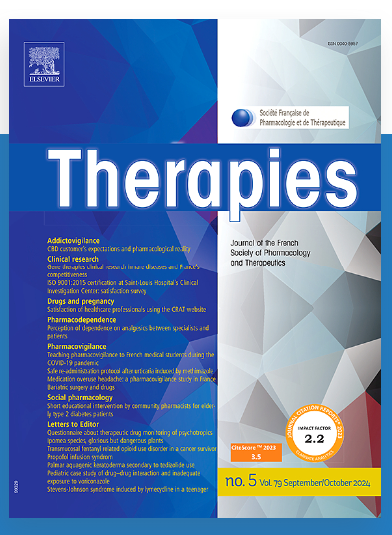
Therapies
https://doi.org/10.1016/j.therap.2024.10.061
Ruxandra Burlacu, Venceslas Bourdin, Patrick Blin, Fabrice Camaioni, Béatrice Clairaz, Michel Lantéri-Minet, Françoise Laroche, François Raineri, Serge Perrot, Jean-Paul Stahl, Nicolas H. Thurin, Stéphane Mouly
Abstract
Non-steroidal anti-inflammatory drugs (NSAIDs) are the second most widely used class of analgesics in France, after paracetamol. Some NSAIDs are available over the counter (OTC), without a prescription, on the advice of a pharmacist. NSAIDs have recently been the subject of safety alerts from France’s Agence nationale de sécurité du médicament et des produits de santé (ANSM), highlighting a risk of worsening certain bacterial infections. This signal has not been confirmed by the European Medicines Agency (EMA), although a “risk of complications due to masking of symptoms of infection” has not been ruled out. These divergent messages can be confusing for healthcare professionals. This literature review, based on an analysis of nearly 200 scientific publications, considers the place of NSAIDs in the OTC management of migraine, tension headaches, postoperative analgesia, acute musculoskeletal and joint pain, dysmenorrhea, viral respiratory infections, including severe acute respiratory syndrome coronavirus 2 (SARS-CoV-2), and their toxicity. The role of the pharmacist in dispensing NSAIDs without a prescription is also addressed. NSAIDs offer rapid and effective pain management in a context of increasingly challenging access to care. Their safety profile is reassuring and generally well established but could be strengthened by conducting an ad-hoc study to rule on the safety signal issued by the ANSM definitively. Pharmacists have the knowledge and tools to ensure the safe dispensing and rational use of NSAIDs, with or without a prescription. The introduction of risk minimization measures, such as decision-support tools, could enable further progress in ensuring the safe dispensing of OTC NSAIDs.
- https://doi.org/10.1016/j.therap.2024.10.061
Over-the-counter non steroidal anti-inflammatory medications: Focus on the management of acute pain

